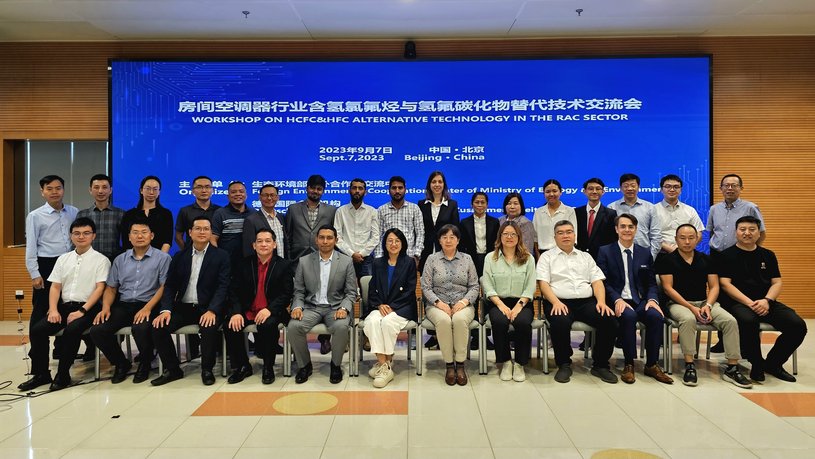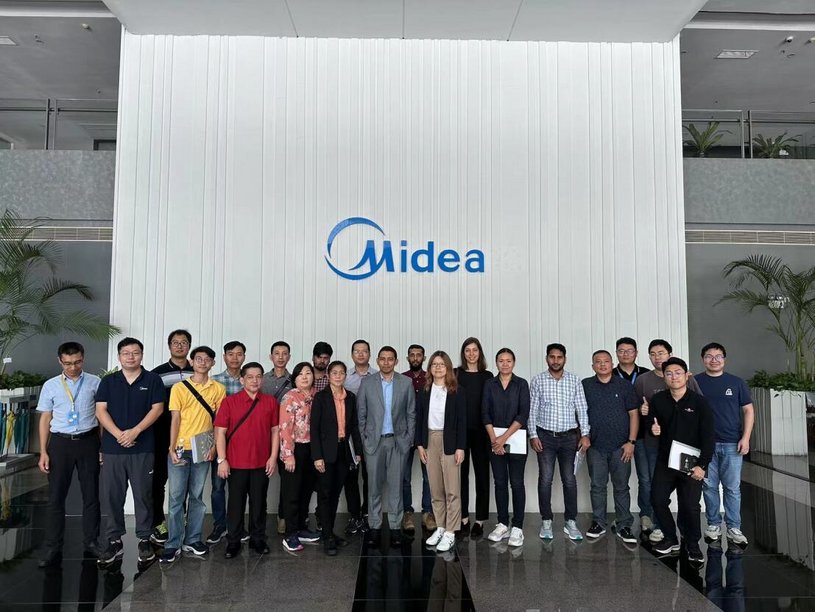From 4-8 September 2023, GIZ Proklima organized a study tour to China to encourage international exchange and share experiences on the production of energy-efficient R290 split-type air conditioning (AC). Representatives from government agencies and AC industry from Bangladesh, Philippines, Thailand, and Vietnam took part in the study tour.
Split ACs are currently the most commonly used appliance for space cooling worldwide. This trend may become more significant as the worldwide demand for split ACs is growing at a rapid pace driven by a rising middle class, rising temperatures, and urbanization. Growing demand means growing greenhouse gas (GHG) emissions from the AC’s energy consumption and their refrigerants. The market uptake of the climate-friendly R290 (propane) AC technology application remains limited up to date, though it has been available for over 10 years. In contrast to other refrigerants, R290 has no ozone depleting potential (ODP) and a global warming potential (GWP) of below 1.
In comparison: the commonly used hydrofluorocarbons (HFCs) have global warming potentials that are up to 11,000 times that of carbon dioxide. Therefore, GIZ Proklima promotes the use of R290, e.g. by organizing the study tour.
The study tour began in the south of China, Guangzhou Province, where the delegates visited the leading R290 AC manufacturers Midea and TCL and the R290 compressor manufacturer GMCC. According to Midea, R290 will be the future. Encouraged by policy and market trends in China and in the EU, Midea is planning to increase its production capacity of R290 split ACs by two to three times over the coming years. 12,000 R290 AC units are already available on the domestic market and in the EU. 18,000 btu/h and 24,000 btu/h units are expected to be available in 2024. GMCC representatives underlined that global markets are shifting to R290 – and that R290 can be used safely. Acknowledging the enormous potential for R290 heat pumps in the EU and the impact of the EU F-Gas Regulation, the company considers the development of R290 compressors – a huge investment in the future. GMCC successfully overcame key challenges in the development process such as identifying a suitable oil and appropriate safety measures. One key benefit of R290 compressors is their high energy efficiency, e.g. the cooling efficiency for R290 is 5% higher compared to R32 compressors. TCL invited the delegates to visit the AC production line and state-of-the-art test laboratories for national and international certification. It became clear that the manufacturers are ready to upscale R290 AC production and export to international markets, especially to countries with HFC regulations in place.
The final destination of the study tour was Beijing. On 7th September, a full-day workshop was held at the Foreign Environmental Cooperation Center (FECO) of the Ministry of Ecology and Environment, jointly organized by the China Household Electrical Appliances Association (CHEAA), and GIZ. The aim of the workshop was to promote exchange and cooperation between China and other countries of Article 5 of the Montreal Protocol regarding R290 room air conditioning. Dong Wenfu from the Atmospheric Environment Department of the Environment Ministry gave the opening speech. Next to representatives from FECO, CHEAA and GIZ, industry experts from , China Institute of Standardization, CVC Testing Technology, Haier, Hisense and, Highly, Qing'an took part in the workshop.
Yang Lirong from the Foreign Environmental Cooperation Center (FECO):
"Since 2008, the Chinese room AC industry has been looking for long-term alternative technology routes. Through continuous technical evaluation and review, the Chinese room AC industry has chosen R290 as refrigerant and gained extensive experience in the actual promotion and application of R290 and has made pioneering progress in the market promotion of related products. In order to promote international exchange, China is willing to cooperate, especially with Article 5 countries, to jointly respond to the global issue of climate change and to promote sustainable development."
Paul Recknagel from GIZ China highlighted that "the question is not if but when economy of scale will be reached for R290. It is now time to leave the pilot phase and to scale up production and market acceptance worldwide". Anja Werntges from GIZ Proklima presented ongoing projects and experiences from more than 10 years of promoting R290 air conditioning worldwide. "Proklima is ready to cooperate with manufacturers and policy makers in setting up supply chains for R290 AC including in Asia, Africa, and Latin America."
The workshop provided an excellent opportunity for international exchange. The morning session focused on energy efficiency standards, safety standards, energy and safety testing requirements, and good practices in installation and maintenance. Experts from the China Institute of Standardization, CHEAA and CVC Testing Technology presented their experiences, lessons learned, and status quo in China. In the afternoon session, representatives from Haier and Hisense presented their product developments of R290 room air conditioners and shared their R290 roadmaps for various markets. Representatives from Highly and Qing'an presented developments of R290 compressors.

The delegates from the Philippines, Thailand, Bangladesh and Vietnam presented international trends for R290 air conditioning and prospects for cooperation. Fred Guillo from Eminent and Kasiyapat Praditkitkul from Supreme provided insights into market introduction of R290 products in Thailand. Noor A Alam from Elite Hitech Industries Limited highlighted the ambitions of manufactures from Bangladesh (who have converted their production lines to R290) to "be part of the team that is moving the world forward". Isagani Soriano from the Department of Energy of the Philippines presented national standards for unitary air conditioning and how they support the transition to R290 air conditioning and more energy efficient products in the Philippines.
After many years of efforts from all parties, they agreed during the workshop that R290 products are safe for markets. We all wish to see more availability and uptake of this super environmental-friendly technology that contributes to climate action.
The study tour was organized by GIZ Proklima’s Green Cooling Initiative (GCI) III and Cool Contributions Fighting Climate Change (C4) II in cooperation with the China Household Electrical Appliances Association (CHEAA) with the support of the German Federal Ministry of the Environment, Nature Conservation, Nuclear Safety and Consumer Protection (BMUV) in the context of the International Climate Initiative (IKI)

